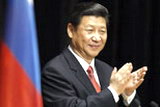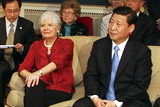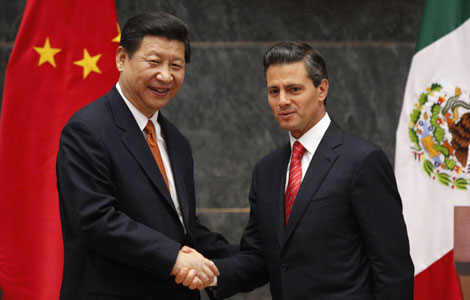First Xi-Obama summit 'positive'
Updated: 2013-06-10 03:48
(Xinhua)
|
|||||||||
WASHINGTON - The first summit between Chinese President Xi Jinping and his US counterpart, Barack Obama, is "positive" as the leaders of the world's two biggest economies started establishing personal ties, says a veteran China expert in the US.
The overall tone of this weekend's meetings, which took the form of an informal get-together, was "positive," Douglas H. Paal, vice president for studies at the Carnegie Endowment for International Peace, a Washington-headquartered foreign policy think tank, told Xinhua.
In the past two days, Xi held lengthy talks and personal conversations with Obama at the Sunnylands Retreat in Rancho Mirage. They vowed to build a new type of great power relationship and step up economic, trade and military-to-military cooperation.
"I was very positively impressed" by the statement made by Obama and Xi, said Paal, who served on the National Security Council staffs of Presidents Ronald Reagan and George H. W. Bush.
The talks were aimed at shaping a broad framework on how to deal with a number of major issues between the two nations, and addressing the question of what kind of relationship they want to build, he said.
On the issue of cyber security, which attracted a lot of American attention, Paal said the two leaders had made headway even before they sat down for this weekend's meetings.
"There was progress even before they sat down," Paal said, citing last week's agreement for both sides to sit down in July to work out protocols and guidelines for dealing with cyber issues.
"They're off to a good start," he said.
Paal blasted the US media for blowing the cyber issue out of proportion. Indeed, the main point of the weekend's meetings was to focus on "the big picture" of US-China relations, not just the cyber issue, he said.
"The (US) media frenzy on (the cyber issue) has been over the top," he said.
Paal also expressed the hope that the two leaders' emerging personal relationship will help smooth over tensions on the Korean Peninsula and lead to further discussions on long-term stability and denuclearization in that area.
"That has to be done at this top level. It can't be done at lower levels (in the beginning)," he said, adding that the two sides can later delegate such talks to lower-level officials.
Related Stories
Xi proposes building new type of ties with US 2013-06-09 14:18
US-China ties on new level: author 2013-06-09 08:12
Chinese and US leaders hold second meeting 2013-06-09 01:21
China, US to build new type of relations 2013-06-09 01:00
Schedule











